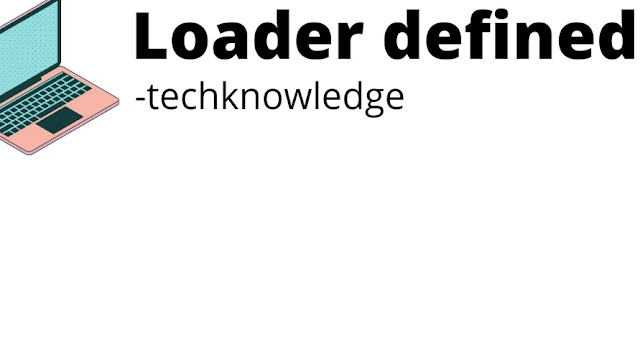What is loader?
In a PC working framework, a loader is a part that finds a
given program (which can be an application or, now and again, part of the
working framework itself) in disconnected capacity (like a hard circle), loads
it into primary stockpiling (in a PC, it's called irregular access memory), and
gives that program control of the PC (permits it to execute its guidance s).
Overview
In PC frameworks a loader is the piece of a working
framework that is answerable for stacking projects and libraries. It is one of
the fundamental stages during the time spent beginning a program, as it places
programs into memory and sets them up for execution. Stacking a program
includes perusing the substance of the executable document containing the program
directions into memory, and afterward completing other required preliminary
undertakings to set up the executable for running. When stacking is finished,
the working framework begins the program by passing control to the stacked
program code.
All working frameworks that help program stacking have
loaders, aside from profoundly particular PC frameworks that just have a decent
arrangement of specific projects. Implanted frameworks ordinarily don't have
loaders, and all things being equal, the code executes straightforwardly from
ROM or comparable. To stack the working framework itself, as a component of
booting, a particular boot loader is utilized. In many working frameworks, the
loader dwells for all time in memory, however some working frameworks that help
virtual memory might permit the loader to be situated in a district of memory
that is pageable.
On account of working frameworks that help virtual memory,
the loader may not really duplicate the substance of executable documents into
memory, but instead may just announce to the virtual memory subsystem that
there is a planning between an area of memory distributed to contain the
running system's code and the substance of the related executable record. (See
memory-planned document.) The virtual memory subsystem is then made mindful
that pages with that district of memory should be filled on request if and when
program execution really hits those spaces of unfilled memory. This might mean
pieces of a program's code are not really replicated into memory until they are
really utilized, and unused code may never be stacked into memory.
Difference between the loader and linker
Loader :
The loader is unique program that takes contribution of item
code from linker, loads it to fundamental memory, and readies this code for
execution by PC. Loader allots memory space to program. Indeed, even it settles
down representative reference between objects. It is responsible for stacking
projects and libraries in working framework. The implanted PC frameworks don't
have loaders. In them, code is executed through ROM.
There are four types of loader:
1. Absolute Loaders
2. Reloacting Loaders
3. Direct Linking Loaders
4. Bootstrap Loaders
Linker :
A linker is exceptional program that joins the article
records, created by compiler/constructing agent, and different bits of codes to
start an executable document have. exe augmentation. In the article document,
linker look and affix all libraries required for execution of record. It
controls the memory space that will hold the code from every module. It
additionally blends at least two separate article programs and builds up
interface among them. For the most part, linkers are of two kinds :
1. Linkage Editor
2. Dynamic Linker
Articles you should read
Business
What is business process outsourcing?
Technology
What is Artificial Super intelligence?
What is synthetic Intelligence?
Threat intelligence feed defined
Don't forget to follow us on Quora.
